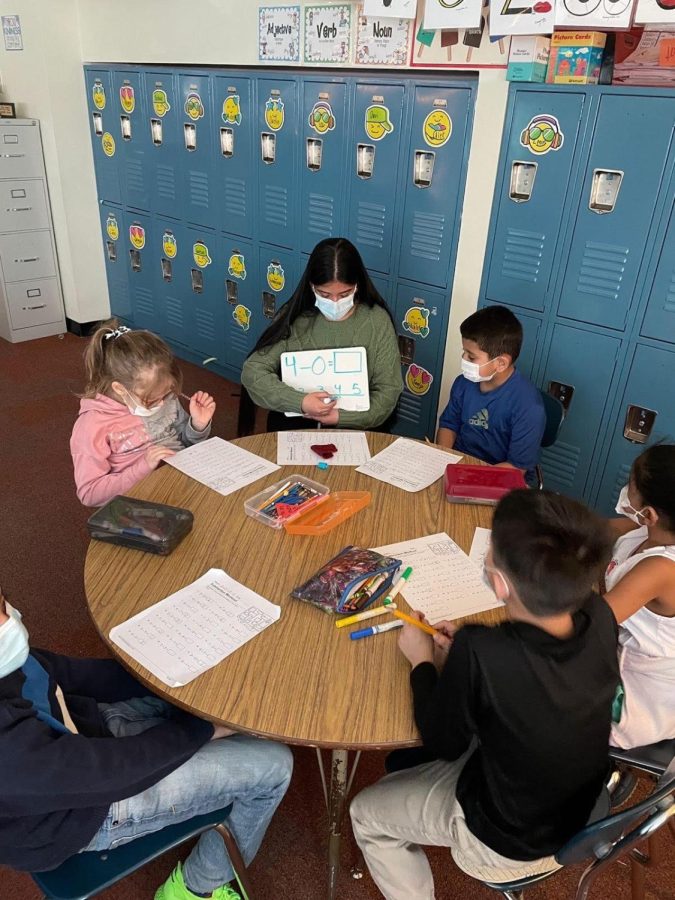With paid internships, students become teachers
Parlin supervising teacher Jacqueline Morel-Cialone
Education intern Jocelynne Gutierrez Guzman explains subtraction to a small group of Parlin elementary students.
June 17, 2022
For the first time this year, seniors in the Education pathway and others got a real taste of what it was like to be “on the other side of the desk” as they took on internships teaching younger students at some of the elementary schools around Everett. Better yet, they got paid to do it.
The program is called HSIEP, which stands for High School Senior Internship in Education Program. This year, it was just open to seniors, but that may change in the future. The school received $120,000 as a grant from the organization “Mass Hire”, which was an initiative from the governor and the Department of Education to recruit young people into the field of education, especially young people of color and other historically marginalized communities.
The goal of the program is to help get a teaching force that is closer to the diversity of the state and its cities. The program also helps to establish a path for Everett students possibly coming back to work for the Everett Public Schools.
“The educational internship changed my point of view in so many ways for the better,” senior Cindy Portillo, who participated in the internship, said. “When I first heard about it, I thought this is perfect for me. I didn’t think twice about signing up. I absolutely love kids and wanted to learn more about them as I went on.”
“It was amazing from the very first day I walked in to the very last day I walked out,” Portillo said. “The kids greeted me with so much joy and had so many questions. I couldn’t have been any happier.”

“As time went on I got to learn about every student individually and they got to learn about me,” Portillo added. “Every student had their own way of learning and had different speeds. As second graders, things were still challenging for them, from spelling to speaking the English language to communicating with their classmates.”
“As a teacher intern I learned that patience is key and being able to explain things to them in a way they’ll understand is pretty challenging,” Portillo said. “I got to see the teachers’ point of view and I have never realized how much teachers do for their students–all the effort they put in so that their students are successful and are able to do what they need to do in the future. Teachers go through so much stress and it’s something everyone should acknowledge.”
The internships are an extension and culmination of the education pathway in the Health and Public Service Academy. Students that have gone through that pathway were automatically placed in the internship. The internships started in November but it wasn’t until February, with the securing of the grant, that they began to get paid.
The grant accounted for 20 students to do 20 hours a week. That turned out to be not as many students as the school wanted but also way too many hours. With the current school schedule, there was no way to get students 20 hours a week without missing too much of their own schoolwork, so a schedule was worked out where kids would miss the minimum amount of time, which turned out to be two school days a week, one A day and one B day. Initially, there was some pushback from teachers having their students absent from class, especially AP classes, but that seemed to diminish as time went on.
In the inaugural year of the education internship, 50 students applied, and 23 were accepted. According to ELA department head Ryan McGowan, the program is not necessarily looking for people who decide when they’re 17 to want to be a teacher, but rather for those students who want to help kids and their community.
As part of the application process, potential interns had to interview for the position. “Their answers helped narrow down who was picked for the internship,” McGowan said. To qualify for the internship they had to be a senior in good academic standings. “Most who applied were A’s and B’s straight across the board. If they were a little lower than A’s and B’s then it started to depend on how well their interview went,” McGowan said.
There will also be a summer component of the internship. Seniors who want to work with students in the summer for EPS would get a priority as well as interns who are already trained and on the payroll. Students will work Monday through Thursday from 8-2:30 and get paid $14.50 an hour. Interns go through confidentiality training, IEP training, privacy, Special Ed, medical, mandated reporter, and ethics training.
“Overall the educational internship was amazing and I got to learn so much. For sure I recommend it to the upcoming seniors,” Portillo said.
For more information, reach out to ELA department head Ryan McGowan at [email protected]






